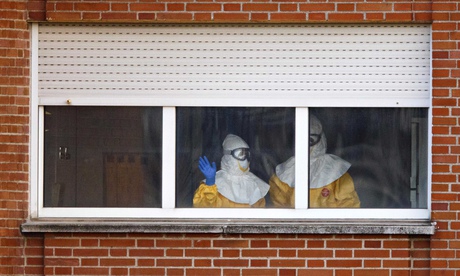
The Spanish nurse infected with Ebola is in a stable condition and showing signs of improvement, the Spanish government has said.
Health official Fernando Simón said the presence of the virus in Teresa Romero Ramos’s blood appears to be diminishing. “We have high hopes that the infection is under control,” he said. However, given the seriousness of the virus he said it was impossible to determine whether she was out of danger.
Another 15 people remain in quarantine in Madrid’s Carlos III hospital, including Romero Ramos’s husband and several health workers who treated her before she tested positive for Ebola last week. So far, none of them has shown any symptoms of the virus.
Romero Ramos became the first known person to contract Ebola outside west Africa after caring for two missionaries with the virus who were repatriated to Spain. Miguel Pajares, 75, died in August and Manuel García Viejo, 69, died in September.
On Friday, health officials said they had secured an antibody cocktail known as ZMab to treat the nurse. She had previously been injected with antibodies extracted from the blood of Ebola survivors.
ZMab, made by the Canadian company Defyrus, is one of the agents used to make ZMapp, an experimental treatment used previously with some success but whose supplies are now exhausted.
The improvement in the nurse’s condition came as a team from the European Centre for Disease Prevention and Control (ECDC) wrapped up their three-day fact-finding mission to Spain. Their findings included concerns that Madrid’s Carlos III hospital was not suitable for emergencies such as an Ebola outbreak, said the Spanish government.
Simón explained that while the team noted that the hospital’s infrastructure was of high quality, they had pointed out areas that required improvement, such as the small size of the room where health workers change out of their protective suits. The ECDC was not available for comment on Sunday.
Throughout the weekend, several protests took aim at how the government has handled the Ebola case. On Saturday evening, hundreds gathered in Madrid’s Puerta del Sol Square to show their support for the nurse. Carrying signs that read “We are all Teresa”, many called for the resignation of the country’s health minister, Ana Mato.
The day before about a dozen health workers heckled the prime minister, Mariano Rajoy, as he made a surprise visit to the hospital to meet with the frontline health workers. As he left the hospital after the visit, healthcare workers pelted the car he was in with latex gloves, calling him “shameless” and a “coward”.
Their anger stemmed from the many questions that have emerged in the past week about the quality of the protective suits worn by health workers, the protocols put in place and the training given to those treating Romero Ramos.
Others have spoken out over the failure to put in place a proper monitoring system for health workers who were in contact with the repatriated missionaries, after it emerged that Romero Ramos contacted health authorities several times before being tested for Ebola.
On Friday, five days after Romero Ramos tested positive for the Ebola virus, the Spanish government announced it would set up a crisis committee to oversee the management of the virus in Spain.
